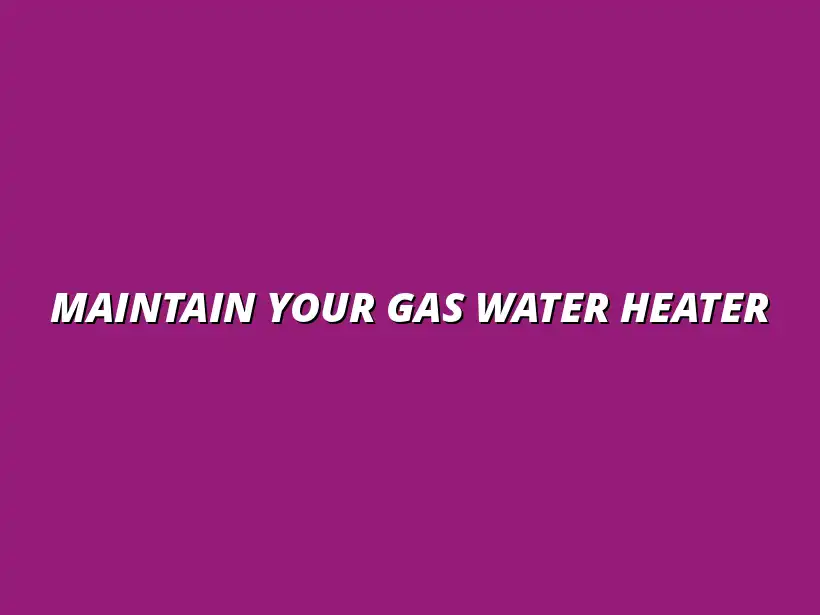
Maintain Your Gas Water Heater
Understanding Gas Water Heaters and Their Importance
Gas water heaters are an essential part of many homes, providing hot water for daily activities like bathing, cooking, and cleaning. They operate by burning natural gas or propane, which heats the water inside a tank. Understanding how these systems work can help you appreciate their value and maintain them effectively. For more tips on overall home plumbing maintenance, check out these plumbing maintenance tips for homeowners.
In a world where comfort and convenience are paramount, gas water heaters offer a reliable solution, especially during colder months. They can deliver hot water faster than most electric models, making them a popular choice among homeowners. Plus, their efficiency can lead to lower energy bills compared to electric alternatives!
The Role of Gas Water Heaters in Modern Homes
Gas water heaters play a crucial role in the overall functionality of modern homes. They not only provide hot water but also contribute to the home’s energy efficiency. With advancements in technology, these heaters are becoming even more efficient, which is good for both the environment and your wallet. Learning how to maintain your water heater efficiently is a great way to maximize its lifespan and save money.
Furthermore, having a reliable gas water heater means less downtime when you need hot water the most. Whether it's during a winter morning or when hosting guests, these heaters ensure your hot water needs are met promptly. Here are some key functions they fulfill:
- Instant hot water supply
- Cost-effective energy use
- Space-saving designs
Benefits of Choosing Gas Water Heaters Over Electric
When comparing gas water heaters to electric models, several advantages stand out. For one, gas water heaters typically heat water more quickly, which is great for large families or homes with high hot water demands. This rapid heating means less waiting time for hot showers or kitchen needs. If you're experiencing issues, understanding common water heater issues can help you troubleshoot or know when to call a professional.
Moreover, gas water heaters often have lower operational costs due to the generally cheaper price of natural gas compared to electricity. Here are a few benefits that make gas water heaters a smart choice:
- Lower monthly energy bills
- Higher recovery rates for increased hot water availability
- Longer lifespan with proper maintenance
Key Components of Gas Water Heaters
To fully understand how gas water heaters work, it's important to know their key components. These parts work together seamlessly to deliver hot water efficiently. Being familiar with these components can empower you to carry out basic maintenance and troubleshooting. For further insights into bathroom plumbing maintenance, see our guide on essential bathroom plumbing maintenance tips.
Let's break down the essential parts that make up a gas water heater. Each component plays a unique role in ensuring your heater operates effectively, providing you peace of mind when using hot water.
Identifying Essential Parts: Burners, Thermostat, and Tanks
The three main components of gas water heaters are the burners, thermostat, and tank. The burner is responsible for heating the water by igniting gas, while the thermostat monitors and regulates the water temperature to ensure it remains at the desired level. Finally, the tank stores the heated water until it is needed.
It's crucial to understand the function of each part to troubleshoot issues effectively. Here’s a brief overview of each essential part:
- Burners: Ignite gas to heat water.
- Thermostat: Controls water temperature settings.
- Tank: Holds the heated water ready for use.
How Each Component Contributes to Performance
Each component of a gas water heater contributes directly to its overall performance. The burners need to be clean and functioning properly to heat the water efficiently. If they become clogged or dirty, it can lead to inadequate heating and longer wait times.
The thermostat is equally important; it ensures that the water is heated to the right temperature without overheating. If the thermostat malfunctions, it could result in either scalding water or lukewarm showers! Remember that regular annual water heater inspection tips can help catch these types of problems early. Here’s how these components work together for optimal performance:
- Burners provide heat to the water.
- Thermostat maintains the set temperature.
- Tanks store and supply hot water as needed.
Frequently Asked Questions About Gas Water Heater Maintenance
Gas water heaters are a vital part of many homes, and it's only natural to have questions about how to keep them running smoothly. Knowing the right maintenance routines can save you time and money in the long run. Addressing drainage issues promptly is also crucial for home maintenance; find affordable drainage solutions for homes here.
Understanding these aspects can help you avoid costly repairs and ensure that your gas water heater operates efficiently. Let’s dive into the frequently asked questions!
How Often Should I Service My Gas Water Heater?
Regular servicing is essential for maintaining the efficiency and longevity of your gas water heater. Generally, it is advisable to have your heater serviced at least once a year. However, there are certain factors that may influence this frequency, such as:
- The age of the water heater.
- Water quality in your area.
- Usage patterns in your household.
If you notice any performance issues, it’s best to schedule a service immediately, even if it’s not the annual check-up time. For Birmingham residents, consider a local plumber in Billesley, Birmingham for your water heater needs. Regular maintenance not only ensures safety but also keeps heating costs down!
What Are Signs That Maintenance Is Needed?
Being vigilant about your gas water heater can help you catch problems before they become major issues. Here are some common signs that your heater needs maintenance:
- Unusual noises, such as popping or rumbling.
- Fluctuations in water temperature.
- Leaks around the tank.
- Rusty water or sediment buildup.
If you notice any of these signs, it's crucial to address them quickly. Ignoring these symptoms can lead to costly repairs or even unsafe situations!
Can I Perform Maintenance Tasks Myself?
Many homeowners wonder if they can handle maintenance tasks on their own. While some tasks are simple enough to do yourself, others may require professional expertise. Here’s a quick breakdown:
- DIY Tasks: Flushing the tank, checking the temperature, and inspecting for leaks.
- Professional Tasks: Replacing the anode rod and inspecting burners.
It’s essential to know your limitations when it comes to maintenance. If you’re unsure about a task or feel uncomfortable, it’s always best to hire a professional!
Best Practices for Enhancing the Lifespan of Gas Water Heaters
To get the most out of your gas water heater, adopting best practices is key. These habits can enhance performance and extend its lifespan. Let’s explore some effective strategies!
Setting the Right Temperature for Efficiency and Safety
Setting the correct temperature for your gas water heater is crucial for both efficiency and safety. The recommended setting is typically around 120°F (49°C) for optimal performance. Here are some benefits of maintaining this temperature:
- Reduces energy consumption.
- Prevents scalding accidents.
- Minimizes the growth of bacteria.
Regularly check your thermostat to ensure it’s set correctly. A little adjustment can make a significant difference!
The Importance of Professional Inspections
While routine maintenance can be done by homeowners, professional inspections are essential for catching potential issues early. These inspections are often more thorough and can identify problems that may go unnoticed. Key benefits include:
- Expert evaluation of all components.
- Access to specialized tools for repairs.
- Peace of mind knowing everything is safe and operational.
Investing in professional inspections at least once a year can save you from unexpected breakdowns and costly repairs down the line!
Final Thoughts on Maintaining Gas Water Heaters
In summary, keeping your gas water heater in top shape requires a combination of regular maintenance and awareness of the signs that indicate service is needed. It’s vital to establish a routine that works for you! By being proactive, you can prolong the life of your heater and avoid disruptions to your hot water supply.
Summarizing Key Maintenance Strategies
To wrap things up, here are the key maintenance strategies for your gas water heater:
- Service annually, or as needed.
- Monitor for any unusual signs.
- Set the temperature correctly.
- Consider professional inspections.
These practices will help ensure that your water heater runs efficiently!
Encouraging Regular Checks for Peak Performance
Remember, regular checks can prevent minor issues from escalating into major problems. Taking a few minutes each month to inspect your gas water heater can make a world of difference!
Call to Action: Schedule Your Maintenance Today
Don’t wait until something goes wrong. Schedule your maintenance today to keep your gas water heater running smoothly and safely. It’s a simple step that pays off in the long run!




